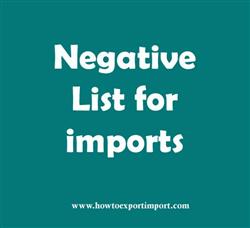Negative List for imports
The negative list for imports consists of:
(a) Freely Importable Items: Import of all items, except those included in the Prohibited List, is permissible free of duty for export production under a Duty Exemption Scheme. Most capital goods fall into this category. Items in this category do not require import licences and may be freely imported by any individual or entity.
 There are no quantitative restrictions on imports of capital goods and intermediates. Import of second-hand capital goods is permitted provided they have a minimum residual life of 5 years. Under the Export Promotion Capital Goods (EPCG) Scheme, exporters are allowed to import capital goods (including computer systems) at concessional customs duty, subject to fulfilment of specified export obligations. Service industries enjoy the facility of zero import duty under the EPCG Scheme. Likewise, hospitals, air cargo, hotels and other tourism-related industries. Software units can use data communication network to export their products.
There are no quantitative restrictions on imports of capital goods and intermediates. Import of second-hand capital goods is permitted provided they have a minimum residual life of 5 years. Under the Export Promotion Capital Goods (EPCG) Scheme, exporters are allowed to import capital goods (including computer systems) at concessional customs duty, subject to fulfilment of specified export obligations. Service industries enjoy the facility of zero import duty under the EPCG Scheme. Likewise, hospitals, air cargo, hotels and other tourism-related industries. Software units can use data communication network to export their products.
Imports are allowed free of duty for export production under a duty exemption scheme. Input-output norms have been specified for more than 4200 items.
These norms specify the amount of duty-free import of inputs avowed for specified products to be exported.
(b) Prohibited List: The import of the following four items in India has been completely banned
• Tallow, Fat and/or Oils, rendered, unrendered or otherwise, of any animal origin including the following:
- Lard stearine, oleo stearine, tallow stearine, lard oil, oleo oil and tallow oil not emulsified or
- mixed or prepared in any way;
- Meat's-foot oil and fats from bone or waste;
- Poultry fats, rendered or solvent extracted;
- Fats and oils of fish/marine origin, whether or not refined, excluding cod liver oil, squid liver
Oil or a mixture thereof and Fish Lipid oil containing Eicospentaenic acid and
Decosahexaenoic acid; and
- Margarine, imitation lard and other prepared edible fats of animal origin.
• Animal rennet.
• Wild Animals including their parts and products and ivory
(c) Restricted List: Restricted items can be imported only with licences and only by actual users. The import of items in this list are restricted on the grounds of security, health and environmental protection or because goods are reserved for production by small and tiny enterprises, which are home-based or village-based and which require low skills and employ a large number of people. However, the policy of restricting import of consumer goods is changing.
Refund of Input Tax Credit (ITC) of GST, FAQ
Migration procedures for existing VAT payers to GST online in India
Refund of GST paid in India, FAQ
4 Conditions when applying for refund of Input Tax Credit (ITC) under GST
Enrolling an existing VAT taxpayers at the GST Common Portal
Difference between types of goods and services and types of GST
4 types of Goods and Services in India for GST rate
Difference between IGST on International goods and IGST on domestic goods.
Navigation controls to enrol with GST in India for existing VAT payers in India How is IGST calculated under Imports?
How is IGST rate on imports treated?
How to register a Digital Signature Certificate under GST in India. GST and e-Commerce Business, FAQ
Definition of E-Commerce under GST
How to identify the steps in enrolment process of a tax payer at the GST common portal.
TDS under GST, Frequently Asked Questions
Does Interest attract on GST Tax payment delay?
Step by step procedure to login with GST common portal in India
Mechanism of Payment of GST tax in India
Useful Information about Export and Import:
How does a Running bond work?
How does Bill of Lading work in DP payment terms?
How does Bill of Lading work in Sight LC
Transferability of Bill of Lading
Transhipment - A redefinition
Triangular shipment
Types of Insurance Documents
How does CENVAT Credit work?
Import General Manifest (IGM)
Importance of Bill of Lading
Is Airway bill a documents of title?
Is Customs House Agents (CHA ) required to be appointed mandatory?
Is DP terms of payment safe in export business?
Is Letter of Credit LC safe for an Importer?
Is ON BOARD CERTIFICATE required for LC negotiation